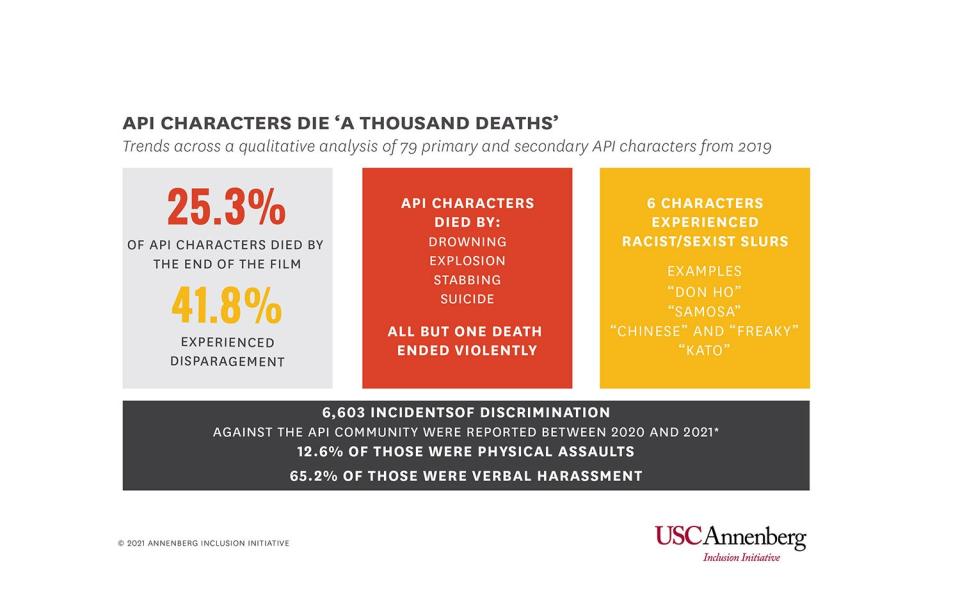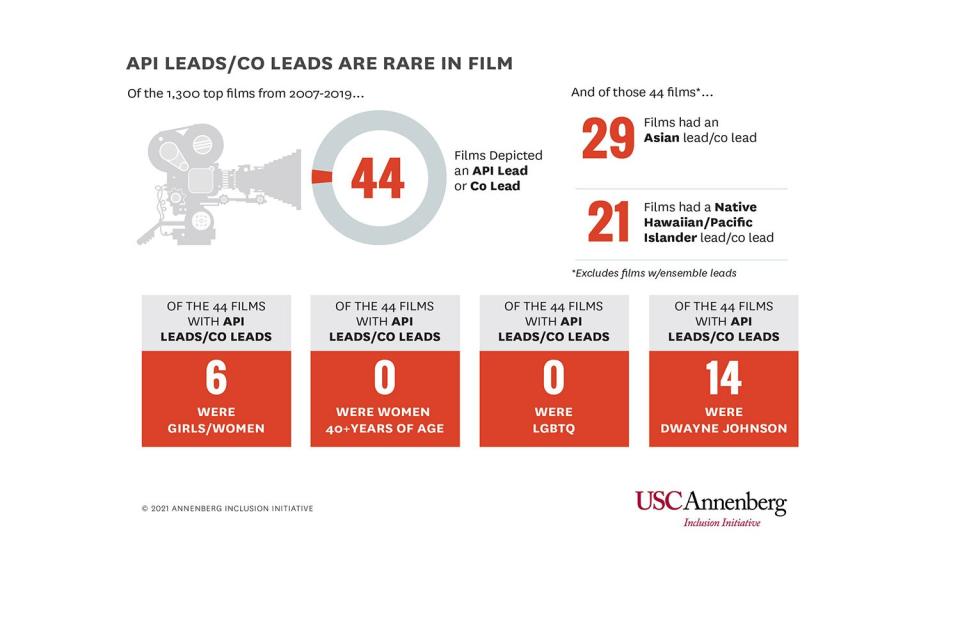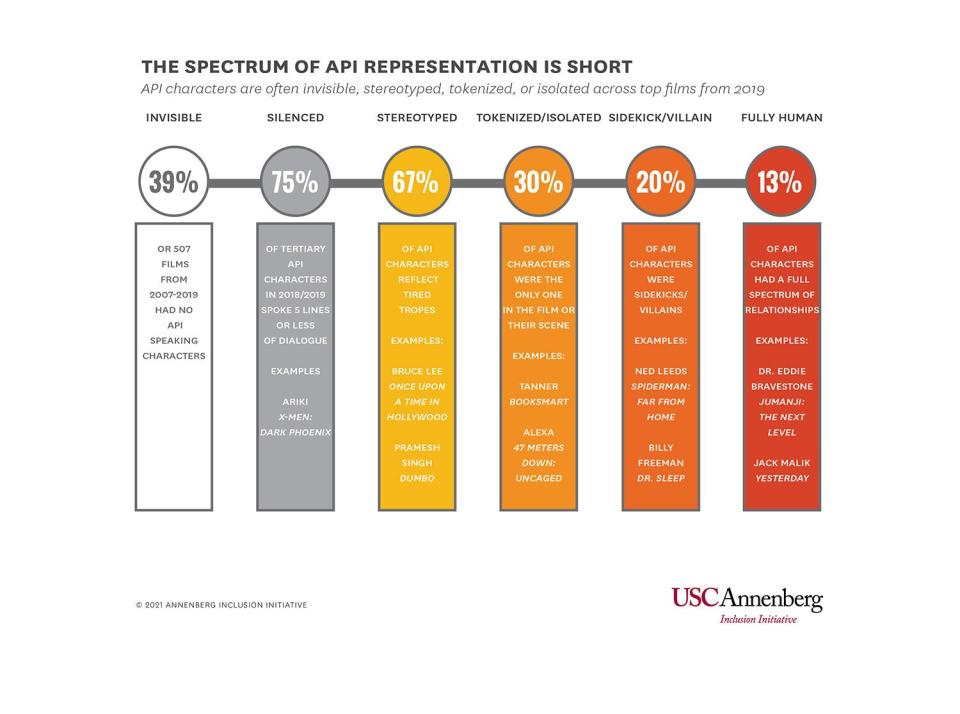API movie study finds 2/3 of characters are stereotypes, 1/3 of leads are played by Dwayne Johnson
Did you know that 67 percent of Asian and Pacific Islander characters in top films from 2019 reflected tired tropes? Or that in the 44 top movies between 2007 to 2019 that depicted an API lead or co-lead, 14 of them were Dwayne Johnson?
These eye-opening findings are part of a new study released Monday that focused on API representation across 100 top-grossing films from 2007-2019 (1,300 in total).
The report — a collaboration between Nancy Wang Yuen, Stacy L. Smith, and the USC Annenberg Inclusion Initiative, with funding from Amazon Studios and UTA Foundation — went on to say that examples of stereotypical API characters included Pramesh Singh (Roshan Seth) in Dumbo and the depiction of Bruce Lee (Mike Moh) in Once Upon a Time in Hollywood. Many public figures, such as the action icon's daughter Shannon, have also taken issue with Lee's "disrespectful" portrayal.

Columbia Pictures Mike Moh as Bruce Lee in 'Once Upon a Time in Hollywood'
Other shocking numbers included that over 25 percent of API characters in top 2019 films died by the end of the movie, and over 41 percent experienced disparagement (six of which were racist/sexist slurs). And of the deaths, all but one ended violently.

Overall, the study found that API characters are absent in mainstream movies. Only 5.9 percent of the characters in 1,300 top films between 2007 and 2019 were API. The number for 2019 was an improvement, at 8.4 percent, but it was still a decrease from the year prior, when it was 9.6 percent. "There has been no meaningful change over time," the researchers concluded.

It gets worse when the researchers specifically looked at API leads and co-leads; the 44 films with API leads/co-leads were driven by 22 individual actors who worked one or more times as a protagonist.

Six of these leads/co-leads were women, with the roles portrayed by four actresses: Constance Wu (two films), Hailee Steinfeld (two films), Auli'i Cravalho, and Chloe Bennet. Compare that to 336 unique white male actors driving the story lines as leads/co-leads across the 13-year span.
That is a ratio of 84 white male actors to every 1 API female actor.
Or, as the authors wrote, "white male actors named Ben, Chris, Daniel, James, Jason, John, Josh, Michael, Robert, Sean, or Tom were more likely to be hired as the top actor in a film than any API female actor with any name auditioning in all of Hollywood."
Among speaking and named API characters, males far outnumbered females (63 percent vs. 37 percent) across the 1300 films, and around 59 percent did not depict a single API girl or woman speaking on screen (API girls/women were also more likely to be hypersexualized on screen).
There was also a severe lack of diverse representation when films did show API characters. Native Hawaiian/Pacific Islanders only made up 5.9 percent of API characters, while the majority were Asian or Asian American. Of the Asian/Asian American actors, East Asian and Indian actors dominated, with only 13.3 percent Southeast Asian.
And in 600 films from 2014 to 2019, only 15 API characters were shown as LGBTQ. When measuring disability, only 26 API characters were shown with a physical, cognitive, or communicative disability.
Invisible, Stereotyped, Tokenized
Like previously mentioned, 67 percent of API characters in top 2019 features reflected stereotypes, such as the perpetual foreigner trope. Nearly a fifth of API primary and secondary characters either spoke English with a non-American accent or in a non-English language.
In the 13-year-span that the researchers examined, 39 percent of top films had no API speaking characters, rendering them invisible. A third of API characters in 2019 were the only one in the film or their scene, like Tanner in Booksmart. And 20 percent of API characters in 2019 were the sidekick or villain role, such as Ned Leeds in Spiderman: Far From Home.

Only 13 percent of API characters were shown as fully human and had a full spectrum of relationships, with two instances being Dr. Eddie Bravestone (Johnson) in Jumanji: The Next Level and Jack Malik in Yesterday.

Frank Masi/Sony
It's also important to note that Hollywood representation didn't adequately reflect the API population in the United States. About 7.1 percent of the US population is API, while only 5.9 percent of characters in 1,300 top films were API.
Behind the camera
The statistics were also dismal for API directors across the 1300 films, as they counted for only 3.5 percent of all directors. And not one API woman received sole directing credit of a live-action film across these top-grossing movies from 2007-2019.
The study did note some positive patterns — films with an API director and producers featured more API leads/co-leads than films without an API director attached. And movies with an API director or casting director depicted more API cast than movies without an API director or caster. Representation made a difference.
Recommendations
The researchers emphasized that while casting more API actors is essential, it's important to take care of other criteria as well, like casting API actors as leads and making sure their characters are authentic.
"Humor that is rooted in racial/ethnic slurs... must be examined closely. Laughter may reinforce problematic portrayals and obscure the harmful nature of language use," they added.
Other recommendations included hiring API storytellers behind the camera, working with API consultants, supporting nonprofits and festivals, and A-list talent showing allyship in actionable ways like hiring and promoting API talent.
And especially in the context of violence against API community, the authors stressed that narratives must move away from violence and disparagement of the API community.
"In this way, films reflect the worst impulses of an environment in which hate crimes, harassment, and violence face the API community daily," they wrote.
"In contrast, research shows that humanization can reduce aggression," they commented in another section. "These steps are necessary to address the concerning way in which the API community has been depicted in film. The privilege of telling stories to mass audiences also carries with it a responsibility to recognize the power such narratives can have in concert."
Read the full study here. This Thursday, Amazon is hosting a free virtual event open to the public to discuss the findings. "Amazon Studios Voices: API Representation in Film and Media," featuring the team behind the study, as well as actors Daniel Dae Kim, Hari Kondabolu, Sophia Ali, Stephanie Hsu, and more, begins at 12 p.m. ET/9 a.m. PT. RSVP here.
Related content:

 Yahoo Finance
Yahoo Finance 